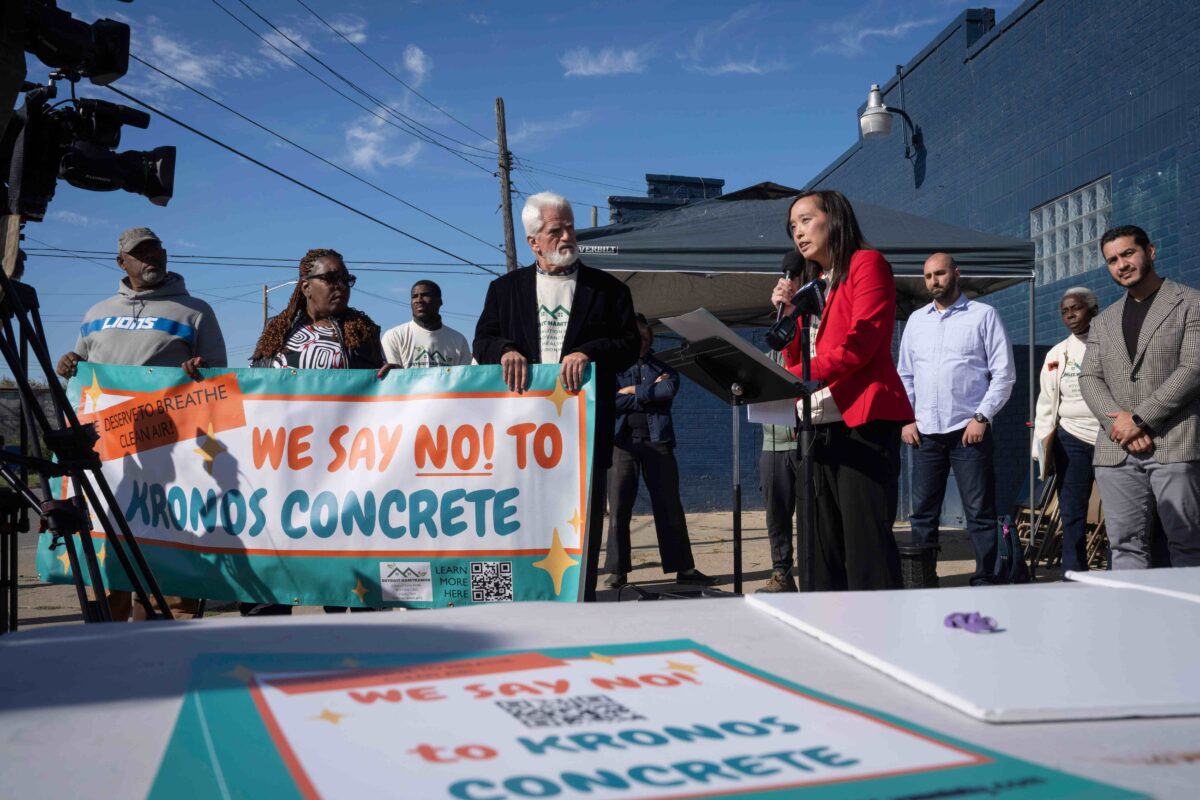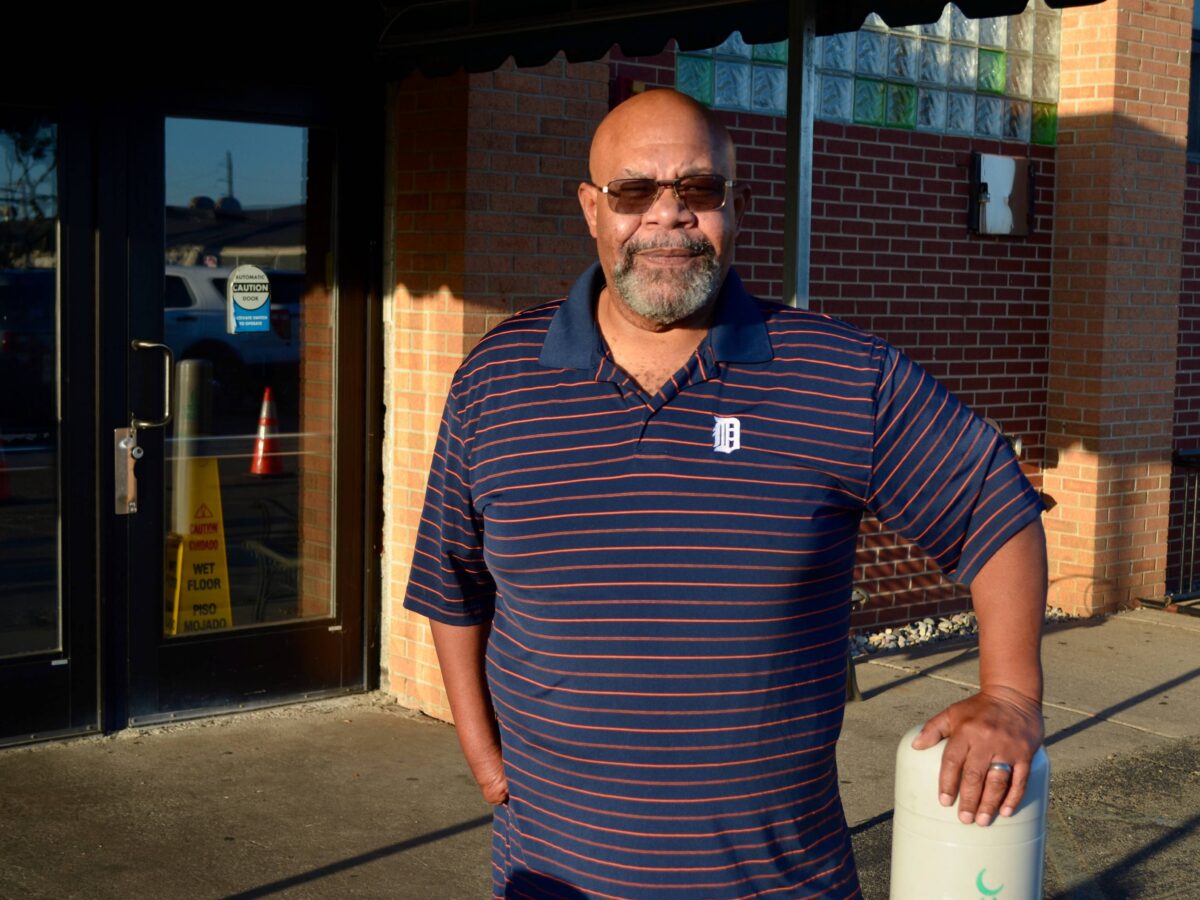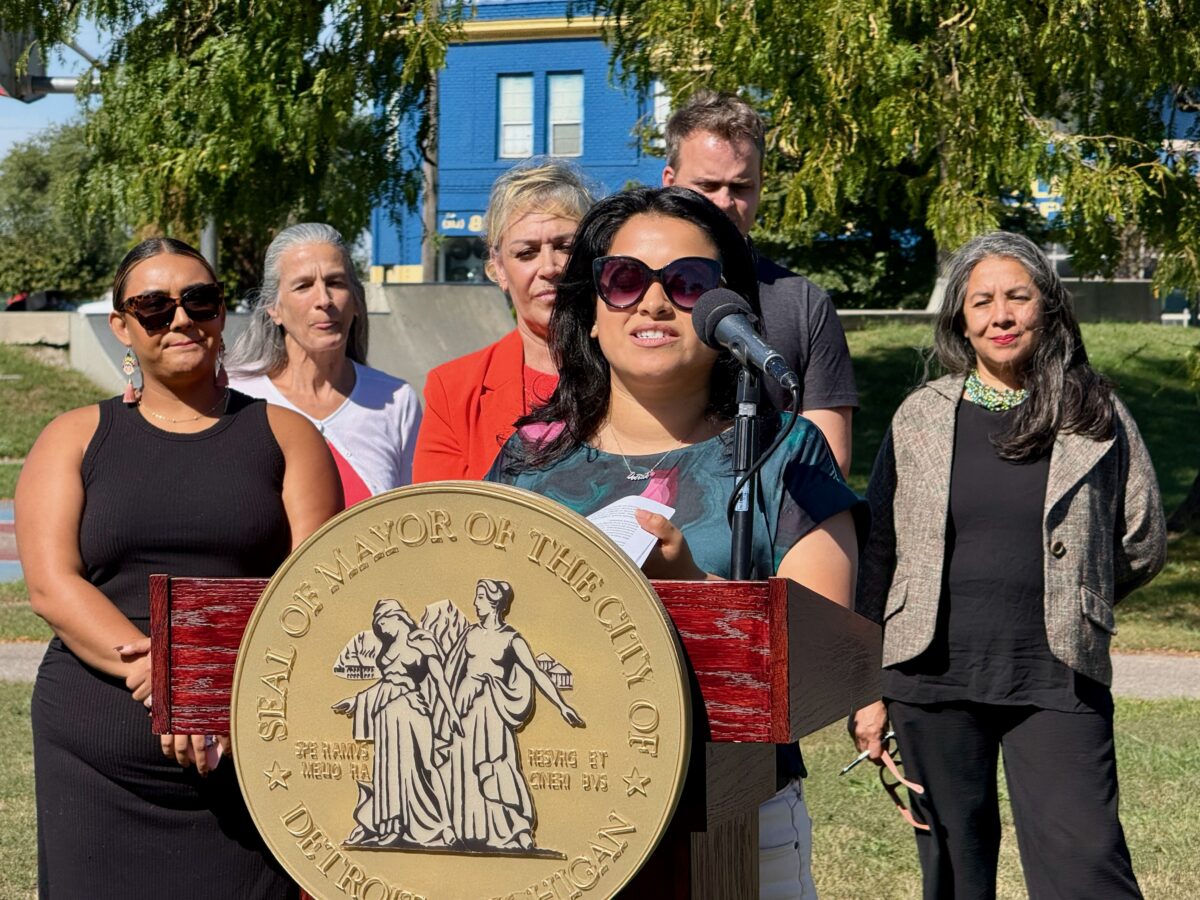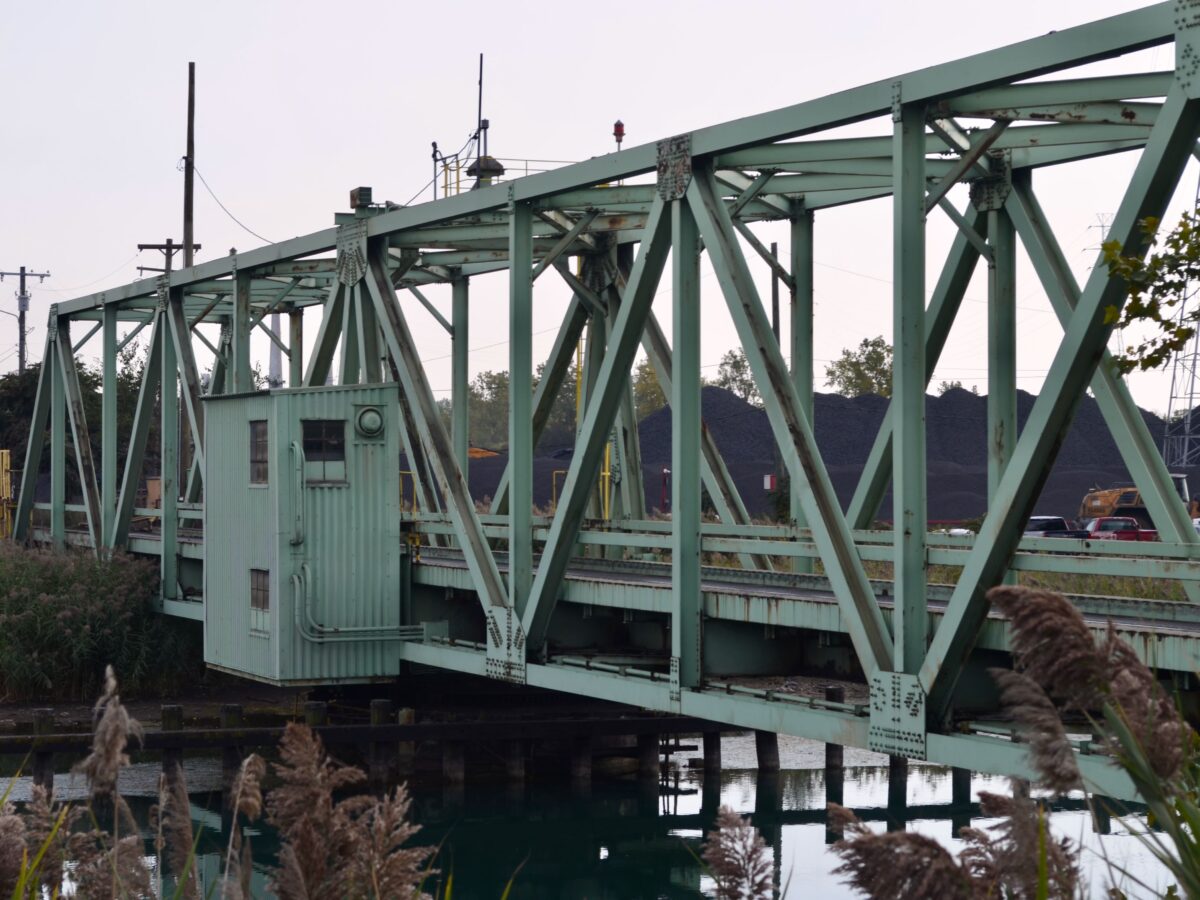Overview:
- While Kronos Concrete operates under heavy industrial zoning, environmental lawyer Andrew Bashi suggests the city could shut it down by declaring it a public health threat.
- "The dust from the plant is deadly," says Diana Tucker Morris, who spent 50 years in the Cadillac Heights neighborhood.
- The director of Detroit's building department says the concrete facility is compliant with city code.
This story was originally published by BridgeDetroit, a nonprofit and nonpartisan news organization. To get regular coverage from BridgeDetroit, sign up for a free BridgeDetroit newsletter here.
Residents, politicians and advocates gathered Friday to demand the closure of a concrete plant that was initially built without proper permits in the middle of a Detroit neighborhood.
The Kronos concrete plant, capable of producing up to 200,000 tons of concrete per year, was built in the Cadillac Heights neighborhood in 2022 by Crown Enterprises, the real estate arm of the Moroun family.
The mixing plant supplies concrete to local projects, such as the new Second Avenue bridge over I-94. Crown had applied for a permit from the city, but before it received one, it built the concrete plant, took it down when ordered to by the city, and reconstructed it with the proper permit.
Since then, residents have complained of dust from the concrete facility, blight and noise. As a part of the company’s efforts to grow into one of the biggest suppliers of concrete in the state, it has bought out residents in the neighborhood and demolished their homes to expand its footprint.
Do you live, work, own a business, or visit family in Cadillac Heights off I-75 and Six Mile? We want to hear from you about what needs more attention. Take our survey
State Senator Stephanie Chang (D-Detroit) and former Wayne County Health Director Dr. Abdul El-Sayed, who is running for state senate, joined residents, local business owners and advocates Friday outside of Paris Bar to call attention to the issue.
Hubert Dorsey, 77, lives half a mile from the plant at 3405 Gaylord. He said noise is the biggest concern for him.
“The 24/7 noise. You can be sitting on your porch at 8 o’clock and all of the sudden, it go boom and boom,” he said.
A resident of the neighborhood since 1970, Dorsey used to have friends that stayed on properties now owned by the Morouns that sit vacant. In the last three years, Crown Enterprises has bought a number of parcels, including houses that they have since demolished with the goal of growing their footprint to at least 29 acres from an estimated 21 acres in the neighborhood. Neighbors report Crown Enterprises is still making home buyout offers.

The dust, too, bothers Dorsey. He now avoids traveling by the plant down 6 Mile to protect his car.
“If you go down there with a clean car, when you get back home, it’s nasty.”
Kenneth Dobson, vice president of the Detroit International Bridge Company, a Moroun-owned subsidiary, said in a statement that it is steadfast in providing outstanding service while being a responsible employer and community partner.
“Kronos Concrete operates as a fully licensed and legally compliant business in the City of Detroit. Employing more than 40 workers, Kronos is also a proud community stakeholder participating in community activities and supporting the city’s economic landscape,” Dobson wrote.
“Beyond providing exceptional service to the city, state and other clients, Kronos is deeply committed to community engagement. Kronos actively supports neighborhood initiatives, collaborates with community associations and participates in programs that uplift Detroit residents.”
Crown Enterprises has not provided information on the number of jobs held by neighbors at the Kronos plant.
Diana Tucker Morris, who was born in the neighborhood and spent 50 years in it, also spoke at the rally Friday.
“I am currently experiencing breathing problems that have increased even more,” she said. “I’ve been working with neighbors… to shut down Kronos Enterprises concrete mixing plant in a residential neighborhood. The dust from the plant is deadly.”
The plant has a by-right use on the land as it is zoned M4 Heavy Industrial and concrete plants are allowed under M4 zoning.

But Andrew Bashi, environmental lawyer for the Great Lakes Environmental Law Center, said there are a few routes the city could take to shut down the plant.
“Just because a facility is zoned to exist in a certain place doesn’t mean it can act however it wants. If you’re causing a nuisance or an unreasonable interference with the enjoyment of your property, that’s the most obvious way to shut it down,” he said.
Either Buildings, Safety Engineering, and Environmental Department (BSEED) or the health department could shut it down, according to Bashi.
“The director has the ability to declare something a threat to public health. They have a lot of tools at their disposal; they’ve just decided to not use any of them before even sitting down with Chang, me or residents about issues we’ve documented over the last couple of years,” he said.
Chang highlighted at the press conference that she asked BSEED for a meeting about dust from the plant, and trucks and their diesel emissions going to and from the plant. Chang’s request was denied.
In an email dated Sept. 25, 2024, BSEED director David Bell wrote that the department was aware of the location and was monitoring and enforcing for compliance.
“The current use is allowed per the ordinance. We are not allowed to consider violations from affiliated companies when reviewing proposed plans. We do not have enforcement authority over trucks and alleged diesel pollution. At this time, we must respectfully decline the request to meet,” he wrote.
Bell clarified the email on Friday after the press conference.
“In my email to Senator Chang, I explained our full understanding of the community concerns and the fact that the company, based on our frequent inspections, has been compliant with city code. I also explained that we cannot legally deny a permit for one property based on issues regarding an unrelated property. So, there really is nothing more of value to be discussed,” Bell told BridgeDetroit in an email.
“Our team remains committed to upholding safety standards and ensuring that all facilities meet or exceed code requirements. We take our responsibility seriously and will continue to monitor and enforce codes within our jurisdiction in the City of Detroit.”
Chang told press conference attendees she remembered coming to the facility last year and feeling unwell from the dust after just a few hours.
“I could feel it in my throat as I was leaving. But I don’t live here,” she said. “Those who have already spoken here today, and many of the folks who are here behind me today, have to put up with this every single day, and it’s terrible that some people have essentially actually been forced to leave just so that they can live a healthy life.”
Bashi questioned why the property wasn’t being rezoned.
Earlier in the week, City Planning Commission officials introduced a plan to rezone 18 parcels in the neighborhood as part of a larger initiative to rezone landalong the 29-mile Joe Louis Greenway to be more environmentally friendly. The proposal called for the rezoning of parcels just up to the property line of Crown Enterprises.

“Why is it that when you propose rezoning, you exclude only the properties that are owned by the Morouns?” Bashi asked. “Does that make sense? It’s not right. So, City of Detroit, we want to see you downzone this whole area.”
El-Sayed, former health director of Wayne County, highlighted the six schools within a mile of the plant and the threat the plant’s particulate matter emissions poses to children.
“On the days that those kids can go outside and enjoy a recess, a day like today, their lungs are being corrupted by the choices made over there,” he said. El-Sayed is running for Michigan’s open U.S. Senate seat.
For children’s small lungs, El-Sayed said the inhalation of particulate matter increases the probability of asthma and chronic lung disease later in life, lung cancer and can even affect the heart.
“They [Crown Enterprises] want to provide concrete to their projects close by, and they don’t want to have to spend the money moving it. So instead, they want to put their concrete factory in the heart of the communities in which people live,” he said.
MOre reporting from planet detroit
Detroiters describe citywide struggle with truck traffic: ‘Our streets are sinking’
Children living within two blocks of I-75 have asthma rates 25% to 42% higher than those living further away from major roads, says Detroit Hispanic Development Corporation’s Rachel Marquez.
Detroit cracks down on Southwest truck traffic with new restrictions: Activist ‘beyond thrilled’
The truck restrictions could be expanded beyond Southwest Detroit, where “the issue is most severe,” says city’s infrastructure chief.
EPA, EES Coke Battery are $135 million apart on Clean Air Act penalties as Zug Island pollution trial ends
The EPA is seeking a $140 million civil penalty against Zug Island’s EES Coke Battery, while the facility and its owner DTE Energy propose a $5 million penalty.





